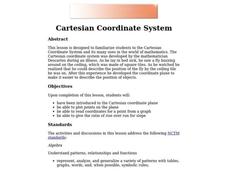Curated OER
Introduction to Linear Functions
Students are introduced to the concept of linear functions. Using new terminology, they describe linear functions in sentences and in data tables. Using the internet, they calculate and record answers to problems which are discussed...
Curated OER
What's My Function?
Students use input / output tables to help them solve algebraic equations. They use patterns and relations to represent and analyze mathematical situations using algebraic symbols.
Curated OER
What's My Function?
Fifth graders utilize input/output tables to help them solve algebraic equations. They incorporate patterns, number sequences and relations to represent and analyze mathematical problems and number relationships using algebraic symbols.
Curated OER
Solving Square Root and Other Radical Equations
In this Algebra II instructional activity, 11th graders solve equations involving radical equations. The instructional activity provides an explanation and worked examples. The two page instructional activity contains three...
Curated OER
Equations, Formulas and Identities
Pupils rewrite word problems using the correct symbols. In this algebra lesson, students find the trigonometric identities and use them to solve problems. They write equations for the trigonometric ratios.
Curated OER
Exponent Rules
Students engage in a lesson that is concerned with the rules of exponents. They practice solving problems that use exponents in a variety of contexts. Students are shown how to use the rules in numerical sequences and after translation...
Curated OER
Identity and Equality Properties: Pages 37-43
In this math worksheet, young scholars use a list of mathematical properties in order to justify their evaluations. Students name multiplicative inverses and properties illustrated in 13 numbers and statements.
Curated OER
Phase Diagrams
In this phase diagram worksheet, students use a phase diagram to determine the critical point, phase boundaries, and phase transitions. This worksheet has 20 problems to solve.
Curated OER
Building a Rover
Students investigate properties of lines and points by making a rover. In this algebra lesson, students plot points correctly on a coordinate plane. They identify coordinate pairs given the plots and lines.
Curated OER
The football and Braking Distance; Model Data with Quadratic Functions
Learners use the quadratic formula to solve application problems. The first problem relates to the path of a football thrown from the top of the bleachers. Students compute the time it will take the football to reach certain heights. In...
Curated OER
Pigs, Goats and Sheep
Student are able to devise and use problem solving strategies to explore problems systematically and mathematically. They also form and solve various types of equations. This lesson requires some prior knowledge of equations.
Curated OER
Equations and Inequalities
Students in a college algebra class use graphs to solve inequalities. Using the coordinate graphing system, they represent the relationship between x and y intercepts. They practice solving equations with complex numbers and locate...
Curated OER
Implicit Differentiation
In this implicit differentiation worksheet, students use the microscope approximation method and Euler's method to approximate values at a given point. This two-page worksheet contains five problems.
Curated OER
Writing a Function Rule
In this Algebra I/Algebra II activity, students determine the equation that correctly represents the relationship between the x and y values provided. The one page activity contains four multiple choice problems. Answers are...
Curated OER
Regressive Music
Student use the Ti calculator to graph sinusoidal graphs. In this calculus lesson, students use the CBL to collect and analyze data of sinusoidal graphs. They manipulate their collected data and make predictions.
Curated OER
Graphing and the Coordinate Plane
Students learn about the Cartesian coordinate plane, understand the four quadrants of the Cartesian coordinate plane, and plot points on the plane. Students read coordinates for a point from a graph and give the ratio of rise over run...
Curated OER
Reading Graphs
Students practice plotting functions on the Cartesian coordinate plane, see several categories of functions, including lines and parabolas, and read a graph, answering questions about the situation described by the graph
Curated OER
I Can Do This! Systems of Equations
Students solve systems of 2-by-2 linear equations using tables,
graphs and substitution. In small groups, classmates work together to discover strategies for solving equations. They use a calculator to graphically represent their answers.
Curated OER
Reading Graphs
Pupils plot functions on the Cartesian coordinate plane. They explore lines and parabolas. Students analyze graphs and answer questions about the information presented on the graph using an online program.
Curated OER
Cartesian Coordinate System
Students explore the Cartesian coordinate plane and plot points on the graph. They interpret coordinates for a point from the graph and give the ratio of rise over run for slope.
Curated OER
Diophantus II
High schoolers use an ancient math game to establish the context for solving problems by investigating them in a systematic and mathematical way. They also need to have the ability to solve various types of equations.
Curated OER
What's The Point?
Students solve word problems using the correct math symbols. In this algebra lesson, students use the TI calculator to graph their equation and analyze it. They find the line of regression and use to draw conclusion.
Curated OER
Which Bag is Which?
Students explore number sense by completing a statistical analysis game in class. In this data graphing lesson, students utilize visual references such as colored cubes and tiles to map out the results of an experiment outcome such as a...
Curated OER
Inequalities Involving Absolute Value
Students solve and graph inequalities involving absolute value. They discuss and identify the basic properties of inequalities, and solve basic examples.

























